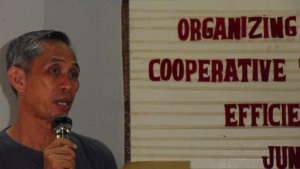Cooperative organizing and management training
Pasali held a 3- day training on “Cooperative organizing and management” last June 24-26, 2010 at Durian garden, Polomolok South Cotabato, nearby General Santos City. It was attended by its 18 staff and volunteers. The resource speaker is from Surigao, Mr. Timotheo Pupa, a cooperative and agriculture expert. With theme “Organizing and management of cooperative towards
effective and efficient FSS-SRI.”
The Farm Support Scheme- System of Rice Intensification (FSS-SRI) is one of the programs of Pasali, it wants to introduce a profit-oriented cooperative in communities on its five target municipalities. Pasali believes that if successful cooperatives are set up, it will sustain the FSS-SRI and value chain (from production, processing to marketing) will be successful. This training was organized to prepare the staff and volunteers in formation of cooperatives.
Republic Act No. 6968 of the Philippines defines cooperative as duly registered association of persons, with a common bond of interest, who have voluntarily joined together to achieve a lawful common social or economic end, making equitable contributions to the capital required and accepting a fair share of the risks and benefits of the undertaking in accordance with universally accepted cooperative principles.
The training starts with workshop, then discussions. There are four main topics discussed in organizing a cooperative. The first is the brief history of cooperative. It was basically started with a family. Second is to identify the problem, like in farming the problem is financing, farm equipments and the low price of farm products especially when harvest time. The question is ”Can setting up a cooperative solve this problem? Mr. Pupa said “ The government can do their part and as well as the organization. That’s why it’s really good if there is a good relationship between the local government unit and the organization.” It’s because by means of cooperative, the government can help solve the
problem, its their obligation to support the programs of cooperative. The third one , “Is cooperative a business or not?” It is business because it will generate income. Another thing discuss is the source of capital. There are many ways to gain capital but the best solution in capital is within the members. By means of contribution of its member.
Further discussed was managing the cooperatives. It was just brief overview of functions of people involved in cooperative. Its because the Cooperative Development Authority (CDA) of the Philippines provides specific trainings on key functions. Like in management and bookkeeping. The common causes of cooperative failures are mismanagement, lack of cooperation between members and no transparency. ”The number one hindrance in cooperative is the attitude of its members, it must have extensive patience for a cooperative to grow,” Mr. Pupa says.
In this training, the discussions and workshop was more on sharing and asking questions regarding the actual experiences rather than the theory of cooperative. In which is good because the actual experiences are really the best way to learn.
Leave a Comment
Be the first to comment!




Leave a comment